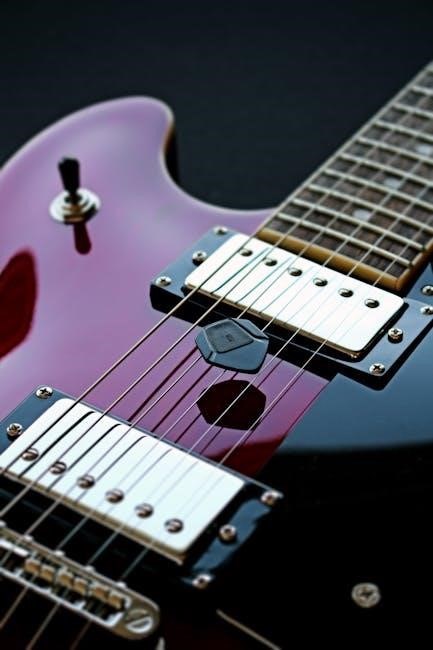Electric guitar strings are a critical component‚ influencing both tone and playability. Available in various materials and gauges‚ they shape the sound and feel of your guitar‚ ensuring optimal performance for every player.
Importance of Guitar Strings in Tone and Playability
Electric guitar strings significantly impact both tone and playability‚ as they directly influence the sound quality and how the instrument feels to the player. The material and gauge of the strings determine brightness‚ warmth‚ and sustain‚ while also affecting how easily notes can be bent and fretted. Proper string selection ensures optimal performance‚ catering to individual playing styles and musical genres.

Materials Used for Electric Guitar Strings
Electric guitar strings are crafted from diverse materials‚ including nickel-plated steel‚ pure nickel‚ stainless steel‚ cobalt‚ and M-Steel. Each material offers unique tonal qualities and durability.
Nickel-Plated Steel Strings
Nickel-plated steel strings are the most common choice‚ offering a balanced tone with warmth and brightness. They provide clarity and a smooth playing feel‚ making them suitable for various genres. Known for their durability and versatility‚ these strings are ideal for both beginners and professionals‚ delivering a consistent performance across different playing styles and musical settings.
Pure Nickel Strings
Pure nickel strings offer a warm‚ vintage tone with reduced high-end harshness‚ ideal for jazz and classic rock. They provide a smooth playing experience and are favored by those seeking a retro sound. Their soft nickel wrap reduces finger noise‚ making them comfortable for extended play. These strings are perfect for musicians desiring a mellow‚ articulate sound that stands out without excessive brightness.
Stainless Steel Strings
Stainless steel strings deliver a bright‚ crisp tone with exceptional durability and resistance to corrosion. Their robust construction makes them ideal for aggressive playing styles and heavy use. The strong magnetic properties enhance sustain‚ providing a clear‚ sharp sound. These strings are perfect for players seeking long-lasting performance and a bold‚ edgy tone that stands out in high-gain settings and dynamic music genres.
Cobalt Strings
Cobalt strings‚ introduced by Ernie Ball‚ offer a wide dynamic range with enhanced low-end response and crisp highs. Their unique composition provides a strong magnetic interaction with pickups‚ resulting in a full‚ rich tone. These strings are ideal for players seeking a versatile sound that adapts well to various playing styles and musical genres‚ while maintaining excellent clarity and sustain.
M-Steel Strings
M-Steel strings are designed to deliver a rich‚ full tone with powerful low-end response. Using a specialized alloy‚ these strings enhance sustain and clarity‚ making them ideal for players who demand a strong‚ resonant sound. Their unique construction also offers improved corrosion resistance‚ ensuring longer string life and consistent performance across various playing styles and musical settings.
String Gauge and Its Impact on Playability
String gauge significantly affects playability‚ with lighter gauges offering easier bending and fretting‚ ideal for beginners‚ while heavier gauges provide durability and sustain for heavier styles.
Understanding String Gauge Measurements
String gauge measures the diameter of a string in thousandths of an inch‚ with higher numbers indicating thicker strings. Electric guitar strings typically range from 0.008 to 0.058. Lighter gauges (e.g.‚ 0.010–0.046) are easier to bend and suit beginners‚ while heavier gauges (e.g.‚ 0.011–0.052) offer more sustain and durability. Gauge sets are often labeled by their thinnest and heaviest strings‚ helping players choose the right balance for their style and tone preferences.
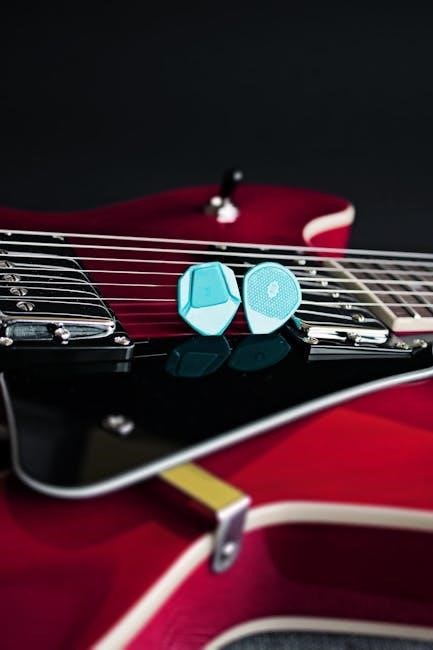
Standard String Gauges for Electric Guitars
Standard electric guitar string gauges range from 0.010 to 0.046‚ with 0.009–0.042 being lighter and 0.011–0.048 or 0.012–0.052 being heavier. These gauges balance tone‚ playability‚ and durability. Lighter gauges suit beginners and bending‚ while heavier gauges offer fuller tone and sustain. Popular sets include Ernie Ball’s Slinky (0.010–0.046) and Fender’s 150 (0.009–0.042)‚ catering to diverse playing styles and musical genres‚ ensuring optimal performance for every guitarist.
How String Gauge Affects Tone and Playability
String gauge significantly impacts both tone and playability; Lighter gauges (0.009–0.042) are easier to bend and suit faster playing‚ while heavier gauges (0.011–0.052) provide fuller tone and sustain. Heavier strings exert more tension‚ improving clarity but requiring more finger strength. The right gauge balances comfort and sound‚ catering to individual playing styles and musical genres‚ ensuring optimal performance for every guitarist.
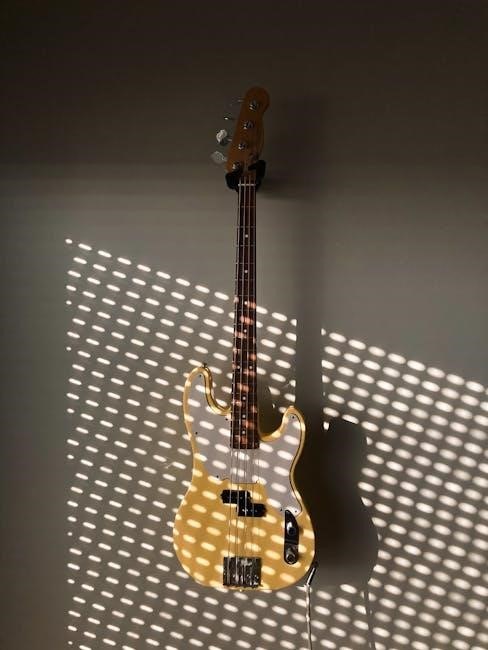
Types of String Windings
String windings vary in texture and tone. Roundwound strings are bright and punchy‚ while flatwound strings offer a smooth‚ mellow sound. Halfwound strings blend both characteristics.
Roundwound Strings
Roundwound strings are the most popular type‚ known for their bright‚ punchy tone and versatility. They feature a textured feel‚ making them ideal for various playing styles. Their rounded wire wrapping provides clear articulation and sustain‚ suitable for genres like rock‚ jazz‚ and pop. These strings are favored for their balanced sound and durability‚ offering a dynamic response that enhances both rhythm and lead playing. Their versatility makes them a top choice for many musicians.
Flatwound Strings
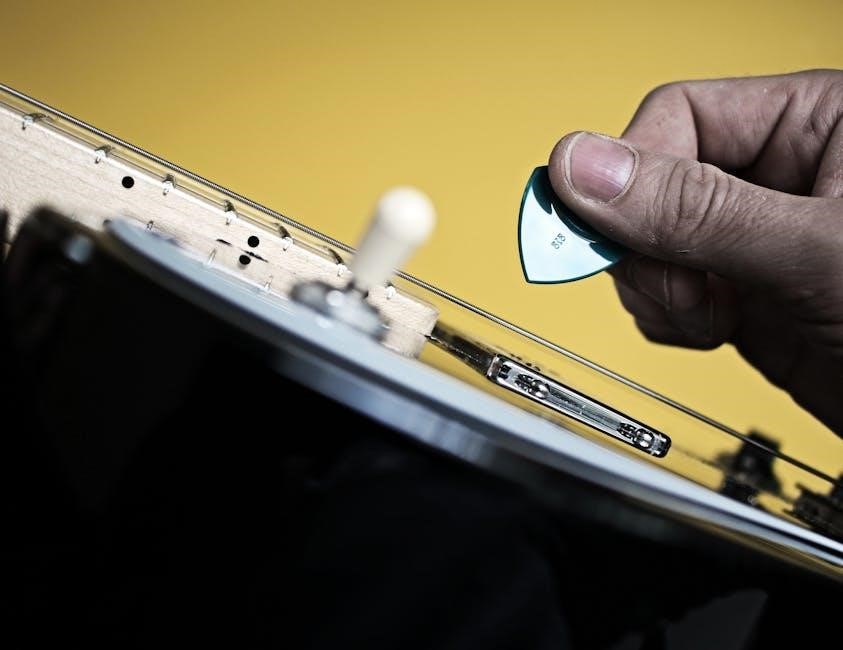
Flatwound strings deliver a smooth‚ mellow tone with minimal finger noise‚ ideal for jazz and rhythm playing. Their flat surface reduces fret wear and offers a comfortable feel. These strings provide a warm‚ vintage sound with even projection‚ making them perfect for players seeking a sophisticated‚ less bright tone. Their smooth texture is also easier on the fingers‚ allowing for long sessions without discomfort‚ enhancing playability for those who prefer a softer touch.
Halfwound Strings
Halfwound strings combine elements of roundwound and flatwound strings‚ offering a balanced tone and feel. They feature a smoother surface than roundwounds‚ reducing finger noise and providing comfortable playability. With a mid-tone brightness‚ halfwounds blend warmth and clarity‚ making them versatile for various musical styles. Their unique texture minimizes fret wear‚ making them a great option for players seeking a compromise between tone and durability‚ while still maintaining a dynamic response suitable for both lead and rhythm playing.
Coated Strings
Coated strings feature a protective layer‚ often made of polymer or ceramic‚ applied to the windings. This coating extends string life by resisting corrosion and reducing finger noise. They provide a smooth playing feel and warm‚ balanced tone while maintaining brightness. Ideal for players seeking durability without sacrificing clarity‚ coated strings are popular among gigging musicians who need consistent performance over time‚ making them a versatile choice for various playing styles and genres.
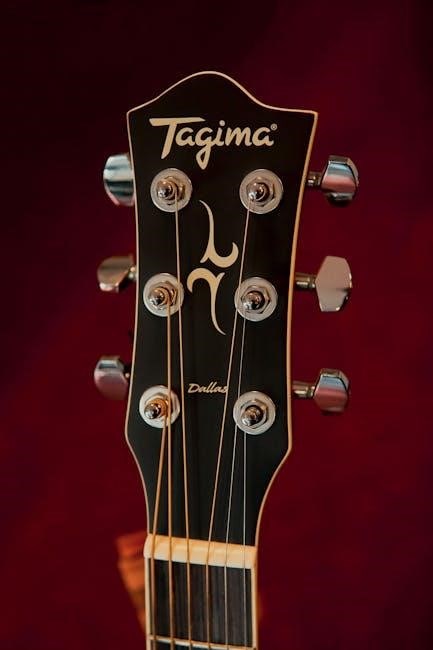
Top Brands for Electric Guitar Strings
Prominent brands like Ernie Ball‚ Elixir‚ D’Addario‚ and Fender dominate the market‚ offering high-quality strings tailored for diverse playing styles and guitar types‚ ensuring exceptional tone and durability.
Ernie Ball Strings
Ernie Ball offers over 200 varieties of electric guitar strings‚ catering to all skill levels and guitar types. Known for their iconic Slinky sets‚ they provide excellent tone and durability. Materials include Nickel Wound‚ Cobalt‚ and M-Steel‚ each offering unique tonal characteristics. Their innovative RPS technology and Paradigm strings enhance strength and longevity‚ making Ernie Ball a favorite among professionals and beginners alike for consistent‚ high-quality performance.
Elixir Strings
Elixir Strings are renowned for their innovative NANOWEB and OPTIWEB coatings‚ which prevent corrosion and extend lifespan. These strings maintain a smooth‚ natural feel and consistent tone. Available in various gauges and materials‚ Elixir Strings cater to diverse playing styles and musical genres‚ offering enhanced durability without sacrificing clarity or responsiveness‚ making them a popular choice among guitarists seeking long-lasting performance and rich tonal quality.
D’Addario Strings
D’Addario Strings are a favorite among professionals‚ offering high-quality materials and precise manufacturing. Known for their consistency and durability‚ they provide a wide range of tones and gauges. D’Addario’s XL series is particularly popular‚ combining bright‚ balanced tones with long-lasting performance‚ making them ideal for various playing styles and musical genres‚ ensuring optimal playability and sound for guitarists of all levels and preferences.
Fender Strings
Fender Strings are designed to deliver authentic tone and reliable performance. Made from high-quality materials‚ they are engineered to enhance the natural sound of your guitar. Their balanced construction ensures clarity and sustain‚ catering to various playing styles. Fender’s commitment to innovation and tradition makes their strings a top choice for musicians seeking consistent quality and exceptional playability‚ perfectly suited for Fender guitars and beyond.
Maintenance and Care of Electric Guitar Strings
Regular maintenance and care are essential for preserving the sound quality and longevity of electric guitar strings. Cleaning and proper storage help prevent corrosion and ensure optimal performance over time.
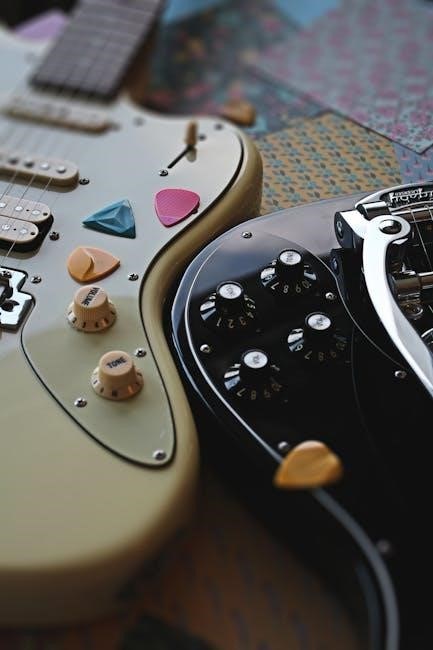
Cleaning Your Guitar Strings
Cleaning your guitar strings regularly maintains tone clarity and extends their lifespan. Use a soft‚ dry cloth to wipe down strings after each use to remove dirt and oils. For deeper cleaning‚ gently scrub with a mild soap solution‚ then rinse thoroughly and dry. Avoid harsh chemicals‚ as they can damage the strings. Regular cleaning prevents grime buildup and ensures optimal playability and sound quality.
How Often to Change Strings
Replace electric guitar strings every 3-4 weeks for heavy use or when tone quality diminishes. For occasional players‚ every 2-3 months is sufficient. If strings show visible corrosion‚ feel grimy‚ or sound dull‚ it’s time to change them. New strings enhance playability and ensure consistent sound quality‚ keeping your guitar performing at its best.
Proper Storage of Guitar Strings
Store electric guitar strings in a cool‚ dry place away from direct sunlight and moisture. Use the original packaging or a sealed plastic bag to prevent corrosion. Avoid bending or stretching strings unnecessarily. Proper storage ensures strings remain corrosion-free and maintain their tone and playability when needed. Always keep spare strings organized for quick access during performances or practice sessions.
Choosing the Right Strings for Your Guitar
Choosing the right electric guitar strings involves considering factors like guitar type‚ playing style‚ tone preferences‚ and string gauge to ensure optimal performance and sound quality.
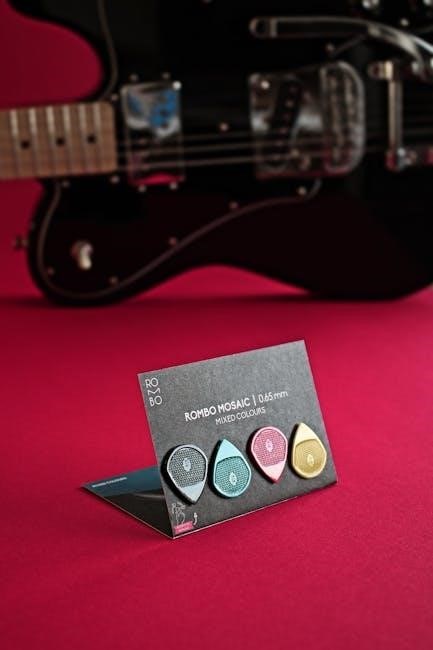
Factors to Consider When Selecting Strings
When choosing electric guitar strings‚ consider your skill level‚ music style‚ and guitar setup. Lighter gauges suit beginners‚ while heavier gauges offer durability for advanced players. Tone preferences‚ such as brightness or warmth‚ depend on materials like nickel or stainless steel. Budget and maintenance needs‚ like coated strings for longevity‚ also play a role. Personal touch and string feel are crucial for comfort and performance.
Trying Different String Types
Experimenting with various string types helps identify the ideal tone and feel for your guitar. Test different materials like nickel‚ stainless steel‚ or cobalt to discover their unique tonal characteristics. Lighter gauges are easier for bending‚ while heavier gauges provide durability. Consider a variety pack to sample multiple options. Your playing style and guitar setup will also influence which strings feel and sound best for you.
Reading Reviews and Recommendations
Reading reviews and recommendations offers valuable insights into the tone‚ durability‚ and playability of electric guitar strings. Player experiences highlight pros and cons‚ while expert suggestions help narrow choices. Comparing brands and sets from manufacturers like Ernie Ball‚ Elixir‚ and D’Addario can guide you to the best strings for your style and sound preferences. This research ensures an informed decision.
